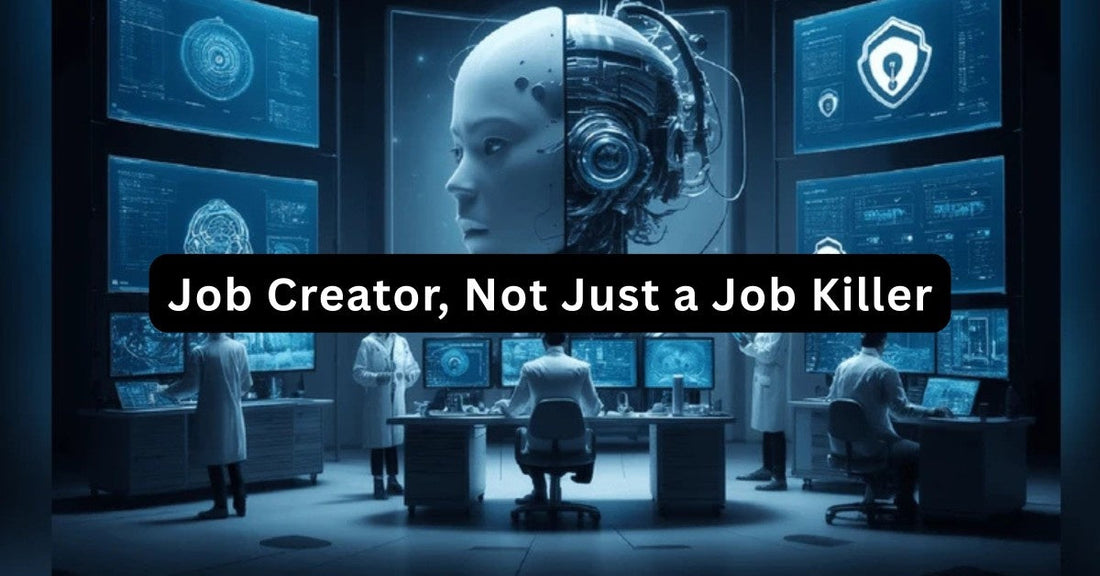AI: A Job Creator, Not Just a Job Killer
Kenji TanakaAI is reshaping jobs, creating new roles and demanding continuous learning.

The rise of artificial intelligence has sparked fears of widespread job losses, but emerging evidence suggests a more nuanced reality. Instead of decimating the job market, AI may be reshaping it, creating new opportunities and altering the nature of work itself.
This shift requires a proactive approach to workforce development and a willingness to embrace lifelong learning. The focus should be on how AI can augment human capabilities, leading to increased productivity and innovation.
The narrative around AI and employment is evolving, moving away from simple displacement to a more complex interplay of automation and augmentation. While some routine tasks are indeed being automated, AI is also creating demand for new skills and expertise.
This transformation presents both challenges and opportunities for workers and employers alike. Adapting to this changing landscape is crucial for ensuring a future where AI benefits everyone.
Highlights
- AI automates routine tasks, enabling workers to focus on complex responsibilities.
- New AI-related jobs are emerging, requiring specialized skills and training.
- Lifelong learning and adaptation are crucial for navigating the changing job market.
Read More: Xbox to be like Office: Everywhere, says Nadella
Top 5 Key Insights
• AI Redefines Expertise: AI allows individuals with less formal education to perform complex tasks by providing immediate feedback and on-the-fly learning. This democratizes expertise and creates opportunities for upward mobility.
• The Experience Trap: The elimination of entry-level jobs by AI can create an "experience trap," where young workers struggle to gain necessary experience. Addressing this requires innovative approaches to training and apprenticeship programs.
• Worker Complementary Technology: AI serves as a "worker complementary technology," enhancing the efficiency and proficiency of various professions. This augmentation allows professionals to be more effective and engaging in their roles.
• New Roles Emerge: AI is creating new job roles such as AI compliance officers, data scientists, and prompt engineers. These roles require specialized skills and training, highlighting the need for workforce development programs.
• Strategic Adaptation: Companies that utilize AI to empower, rather than replace, workers will experience greater innovation. This strategic approach maximizes the benefits of AI while minimizing potential negative impacts.
Read More: Jessica Alba's Net Worth: Acting, Business & Real Estate
Expert Insights
David Autor, MIT Economist: "AI changes the nature of jobs by automating routine tasks, which allows people with less formal education to perform more complex tasks."
Peter Cappelli, Professor of Management at The Wharton School: "Everyone wants to hire somebody with three years' experience, and nobody wants to give them three years' experience."
Read More: Chegg Cuts Staff, CEO Replaced Amid AI Disruption
Wrap Up
The integration of AI into the workforce represents a significant turning point, demanding adaptability and a forward-thinking approach. By embracing continuous learning and focusing on how AI can enhance human capabilities, individuals and organizations can navigate this transition successfully.
The future of work lies in the synergy between human ingenuity and artificial intelligence, fostering a landscape of growth and innovation. Ultimately, the goal is to harness AI's potential to create a more inclusive and prosperous future for all..
Read More: AI Search Engines Favor Less Popular Sources: Study
Author
Kenji Tanaka - A technology futurist and digital strategist based in Tokyo, specializing in emerging tech trends and their impact. He explains complex innovations and the future of digital skills for Enlightnr readers.
More to Explore
- Choosing a selection results in a full page refresh.
- Opens in a new window.




